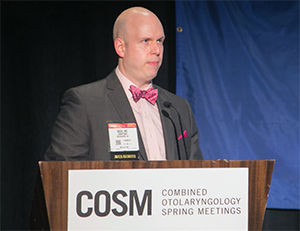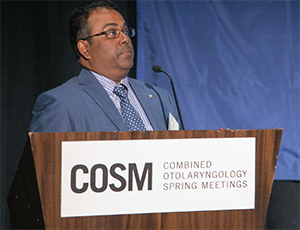Thomas R. Collins is a freelance medical writer based in Florida.
Explore This Issue
June 2017Triological Society New Fellow Thesis Award Winners
Harris P. Mosher Thesis Award
 The 2017 Mosher Award went to Jonathan M. Bock, MD, associate professor of otolaryngology at the Medical College of Wisconsin in Milwaukee.
The 2017 Mosher Award went to Jonathan M. Bock, MD, associate professor of otolaryngology at the Medical College of Wisconsin in Milwaukee.
Dr. Bock and his team set out to better understand the natural clinical progression of aspiration to pulmonary compromise by doing a retrospective chart review of patients who have aspirated. They examined the cause for aspiration and whether patients went on to develop pneumonia, pneumonitis, or another life-threatening pulmonary illness.
Among the 564 patients found to have aspirated on videofluoroscopic swallowing study (VFSS) at their center in 2009 and 2010, the researchers found that certain causes for dysphagia were highly associated with patients developing pulmonary events over the next 54 months, Dr. Bock said.
Those with dysphagia of an unknown origin who had general weakness, frailty, and deconditioning had a hazard ratio (HR) of 3.18 compared to those for whom stroke was the cause. Those with cricopharyngeal or esophageal dysphagia had an HR of 2.63, and those with post-surgical dysphagia an HR of 2.22, he said.
When researchers looked at mortality, they found the hazard ratios were increased for dysphagia of unknown origin, post-surgical dysphagia, and neurological etiology. They found no statistically significant association among penetration-aspiration score, modified diet, and rates of pneumonia or mortality.
Since there was no correlation between outcomes and diet, Dr. Bock said that the data suggest that clinicians should “at least consider more aggressive feeding regimens for patients in the end stages of their lives, when eating is perhaps one of their last few pleasures they have left.” He added, though, that more prospective studies are needed to further define the benefits of diet modification for patients with dysphagia.
Edmund Prince Fowler Thesis Award
 Syed Ahsan, MD, a head and neck surgeon at Kaiser Permanente in Anaheim, Calif., was awarded this year’s Fowler Award for his work demonstrating the therapeutic effects of deep brain stimulation (DBS) in an animal model.
Syed Ahsan, MD, a head and neck surgeon at Kaiser Permanente in Anaheim, Calif., was awarded this year’s Fowler Award for his work demonstrating the therapeutic effects of deep brain stimulation (DBS) in an animal model.
In work that was performed at Wayne State University in Detroit, researchers wanted to clarify the neural mechanisms at work in DBS-induced tinnitus suppression, and to test for tinnitus suppression by DBS with electrical stimulation of the caudate nucleus in a rat model.
The rats were exposed to noise to bring about tinnitus. The suppression of the tinnitus was then assessed using the acoustic startle reflex and evaluating the effects on neural indicators of tinnitus. Researchers found that DBS reduced the neural markers of tinnitus and behaviors that tend to determine tinnitus in this model. Dr. Ahsan said the study suggests that an indirect pathway is at work in the disorder.